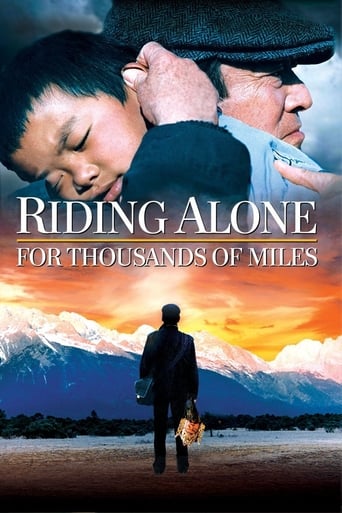WILLIAM FLANIGAN
Viewed on DVD. Subtitles/translations =ten (10) stars; production values = nine (9) stars; Action Director Yimou Zhang takes his hand off the throttle to deliver a change of pace drama with essentially two stars: a small Chinese boy and the spectacular scenery of (then) remote Southwestern China. He conjures up an interesting tale, but it is far from an audience magnet. The photo play probably looked better in Preproduction (script, storyboards, casting, etc.) than it does on screen. This may be due to prosaic, by-the-book editing; but it seems mostly the result of lethargic acting by professional actors/actresses (the rural-area non pros out perform the pros in the majority of scenes). Nicely captured and delineated by the Director are the different levels of behavior from business dictates to cultural conditioning to the real feelings of Japanese and Chinese as individuals (perhaps you have encountered these dichotomies in your travels). Cinematography (wide screen, color) and scene lighting are excellent. So is set design. Score is fine, but the surround sound field is not there yet. Subtitles/translations are a pure pleasure to behold. Not only are near simultaneous line readings in Japanese and Mandarin translated well, but the name of every film contributor listed in the opening and closing credits is translated into English from Japanese or Mandarin (even those with English-lettered names are translated into Mandarin!). Rarely (make that just about never for Japanese films) is credit given where it is due in movie translations. Well worth watching. WILLIAM FLANIGAN, PhD.
rljslaughter
"Riding Alone for Thousands of Miles" is a touching story about a man's quest for redemption and to repair the relationship with his son. This is also a story about a foreigner in a strange country and the isolation one can feel by not speaking the language, even when you are surrounded by people. Even though the father and son are never able to see each other before the son dies, the gesture the father makes by going on his journey leads to a much deeper connection between the father and son than they would have achieved through small talk in a hospital room. Redemption is achieved not only through his son's letter, but also, showing the pictures of Yang Yang to his imprisoned father, indirectly reconnecting them together.
ckcaswell1
Riding Alone for Thousands of Miles. It makes you laugh with cute jokes and jabs, and it makes you cry with heart breaking realities. Ken Takakura says little in the movie, but you can tell every thought that goes through his mind as he goes along his journey of atonement for his son. The simple task that he goes to perform turns into a long drawn out journey that eventually leads to him finding peace with his past wrongdoings and learning more about his son's life, which had formally been a distant, almost nonexistent relationship. We see the determination and patience that this man goes through to achieve his goal, even when it is apparent that his task is near impossible and inconvenient to achieve. Yimou Zhang fills the screen with the beautiful landscapes of China and uses everything in the scene to his advantage. The casting of the villagers and the little boy was done perfectly as well. I found myself falling in love with the little boy, even through his stubbornness and young determination. This movie is a great experience to enjoy for everyone and will make you redefine your close relationships and will make you want to equate your life accordingly.
mfarrell87
Riding Alone For Thousands of Miles is an excellent film that truly depicts the differences in the Chinese and Japanese cultures (not in a negative tone, just different). Yimou Zhang's film creates a sense of isolationism when we see Japan. By and large, it feels like Japan has lost touch of its culture by keeping up with today's technology/modernization. In Japan, the audience never sees more than one person in a shot, with respect to Mr. Takata and his daughter-in-law. The colors that the audience sees in Japan reflect Takata's emotional demeanor, blue and gray. Although the fishing village that Mr. Takata moves to after his wife died was very tranquil, it creates a very somber tone and adds to the feeling of absolute solitude.On the other hand, Zhang depicts China as a group-oriented culture that remains connected to its ancient roots and traditions. China feels more warm and accepting than Japan due to its vibrant colors that are used to express the rich heritage of the operas.The opera, "Riding Alone for Thousands of Miles," proves to be both a critical and also meaningless component of the movie. While filming the opera becomes the goal of Mr. Takata to re-connect with his son, it is not the opera that connects them; the heartfelt expression to travel to China is what Takata's son responds to. However, the question still remains as to whether or not Mr. Takata's son actually said anything or if it was just a ploy to get Mr. Takata to come home.Zhang Yimou does a great job of bringing Mr. Takata's emotions to a forefront. It was especially moving when Mr. Takata had to film a tape of himself asking for permission to go into the prison to tape the opera. It makes the audience wonder whether or not Takata would've been able to express his emotions if he wasn't twice removed by the TV screen and through the translation.All in all, I commend Zhang Yimou for a creating a movie that provokes the audience to think outside of the box.



